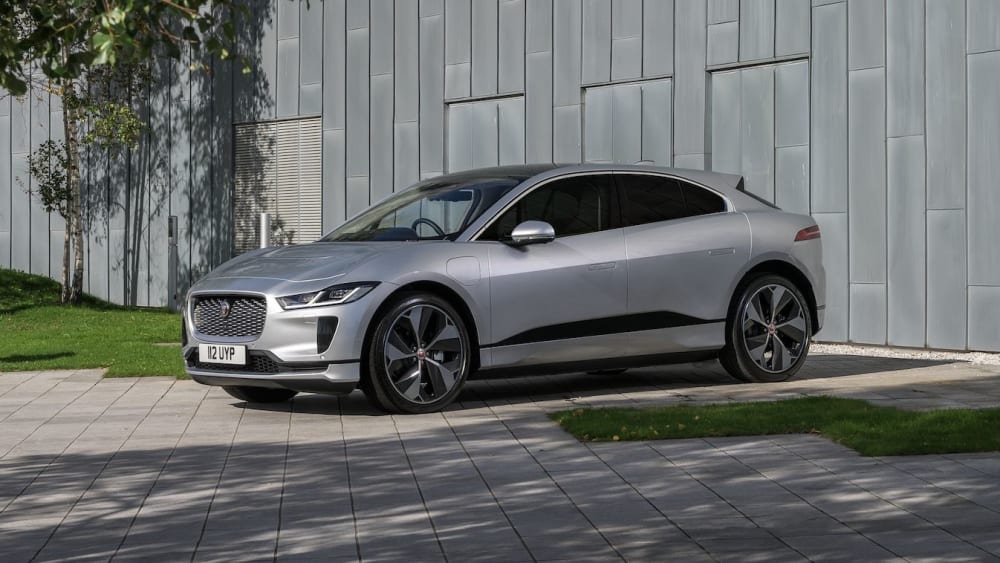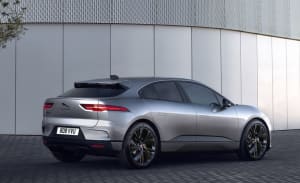Information and electric vehicles of the [object Object] brand

![[object Object] logo](https://res.cloudinary.com/donyiousk/image/upload/w_80/f_auto/c_scale,w_1400/v1/car/mtr3oninfdd7s8a1itib)
Jaguar
Leave the gas, keep the grin.



Jaguar electric vehicles
What makes Jaguar EVs different from other brands?+
There are several key things that make Jaguar EVs stand out from other brands:
- Focus on Design and Luxury: Jaguar has a long history of producing beautiful and luxurious cars, and this tradition carries over to their EVs. The I-PACE, for example, is a sleek and stylish SUV that looks unlike any other EV on the market. The upcoming XJ electric sedan promises to be even more luxurious, with a focus on comfort and technology.
- Performance: Jaguar EVs are not just about looking good; they also drive great. The I-PACE has a powerful electric motor that produces up to 378 horsepower and 510 lb-ft of torque, which is enough to propel it from 0 to 60 mph in just 4.5 seconds. The XJ is expected to be even faster, with a rumored 0-60 time of under 3 seconds.
- Handling: Jaguar EVs are also known for their excellent handling. The I-PACE has a low center of gravity and a sophisticated suspension system that give it a surprisingly sporty feel for an SUV. The XJ is expected to be even more agile, thanks to its lightweight construction and rear-wheel drive layout.
- Range: Jaguar EVs offer competitive range. The I-PACE has an EPA-estimated range of 222 miles, and the XJ is expected to have a range of over 300 miles. This is enough for most drivers to do their daily commute and errands without having to worry about running out of juice.
- Commitment to electrification: Jaguar is one of the few luxury carmakers that is fully committed to electrification. The company has announced that it will stop selling gasoline-powered cars by 2025, and it is investing heavily in the development of new EV technologies. This commitment to electrification is a major selling point for environmentally conscious buyers.
Of course, there are also some drawbacks to Jaguar EVs. They are typically more expensive than their competitors, and their range is not as good as some other EVs on the market. However, if you are looking for a luxurious and performance-oriented EV, then Jaguar is definitely a brand worth considering.
Here are some additional things to keep in mind when comparing Jaguar EVs to other brands:
- Charging infrastructure: Jaguar is working to expand its charging infrastructure, but it is still not as extensive as Tesla's. This could be a problem for some buyers who live in areas with limited charging options.
- Brand reputation: Jaguar is a well-respected brand with a long history of producing quality cars. However, it is not as well-known for its EVs as some other brands. This could make it more difficult to sell a used Jaguar EV.
- Warranty: Jaguar offers a competitive warranty on its EVs, but it is not as good as some other brands. This is something to consider if you are concerned about the long-term reliability of your car.
What are the different models of Jaguar EVs available?+
As of today, January 3, 2024, there is only one Jaguar EV model available, which is the Jaguar I-PACE. It's a fully electric performance SUV that was first introduced in 2018.
The I-PACE has a sleek and stylish design, with a bold front grille and sculpted hood scoop. It also has a spacious and luxurious interior, with plenty of room for five passengers and their luggage.
The I-PACE is powered by a dual-motor electric drivetrain that produces up to 395 horsepower and 512 lb-ft of torque. It has a range of up to 246 miles on a single charge, and it can accelerate from 0 to 60 mph in just 4.5 seconds.
There are three different trim levels of the I-PACE available: S, SE, and HSE. The base S model comes with standard features such as 19-inch alloy wheels, a panoramic sunroof, and a 10-speaker Meridian sound system. The SE model adds features such as heated and ventilated seats, a 12.3-inch digital instrument cluster, and a head-up display. The top-of-the-line HSE model comes with all the bells and whistles, including 20-inch alloy wheels, a 16-speaker Meridian sound system, and a massaging driver's seat.
The Jaguar I-PACE is a great choice for drivers who are looking for a luxurious and performance-oriented electric SUV. It's also one of the few EVs on the market with a true sports car feel.
Here are some additional details about the Jaguar I-PACE:
- Pricing: The I-PACE starts at $69,850 for the S model, $75,450 for the SE model, and $82,150 for the HSE model.
- Charging: The I-PACE can be charged using a Level 2 charger or a DC fast charger. A Level 2 charger can fully charge the battery in about 10 hours, while a DC fast charger can charge the battery to 80% in about 40 minutes.
- Warranty: The I-PACE comes with a 4-year/50,000-mile warranty on the battery and electric drivetrain.
How much do Jaguar EVs cost?+
There is only one Jaguar EV model currently available, which is the I-PACE. The starting price for the I-PACE in the US is $69,995. However, the actual price can vary depending on the trim level and options you choose. For example, the R-Dynamic HSE trim level starts at $80,995.
In addition to the base price, you will also need to factor in the cost of charging, which can vary depending on your electricity rates and how much you drive. You may also be eligible for government incentives that can help offset the cost of buying an EV.
Here are some additional factors to consider when calculating the cost of ownership of a Jaguar EV:
- Fuel costs: EVs are much cheaper to fuel than gasoline-powered cars. In the US, the average cost of electricity to drive an EV is about $0.04 per mile, compared to $0.14 per mile for a gasoline-powered car.
- Maintenance costs: EVs have fewer moving parts than gasoline-powered cars, which means they require less maintenance. This can save you money in the long run.
- Depreciation: EVs tend to depreciate more slowly than gasoline-powered cars. This means that you will likely get more money back when you sell your EV.
Overall, the cost of ownership of a Jaguar EV is lower than the cost of ownership of a gasoline-powered car. However, it is important to consider all of the factors involved before making a decision.
What is the range of Jaguar EVs?+
The range of Jaguar EVs varies depending on the specific model you're interested in, as well as some additional factors like driving style and environmental conditions. Here's a quick breakdown:
Jaguar I-PACE:
- Official WLTP range: Up to 470 km 292 miles
- Real-world range: Expect this to be lower, typically around 300-400 km 180-250 miles depending on your driving habits and terrain.
Jaguar E-PACE and F-PACE Plug-in Hybrids:
- Electric-only range: Up to 62 km 39 miles) for E-PACE and up to 65 km (40 miles for F-PACE.
- Combined range electric + petrol): Significantly higher, approaching 800 km (500 miles for both models.
Here are some additional things to keep in mind:
- The official WLTP range is determined under controlled testing conditions and may not reflect real-world driving.
- Factors that can affect your EV range include:
- Driving style: Aggressive acceleration and high speeds will use more energy.
- Weather: Cold weather can reduce battery range.
- Terrain: Hilly terrain will use more energy than flat roads.
- Air conditioning and heating: Using these features will also use more energy.
For a more accurate estimate of the range you can expect, you can use a Jaguar EV range calculator, or take a test drive to see how the car performs in your typical driving conditions.
How long does it take to charge a Jaguar EV?+
The charging time for a Jaguar EV depends on the model of the EV, the charger you're using, and the amount of charge the battery has left. Here's a general guide:
- Level 1 charging 120 volts: This is the slowest type of charging, and it's typically only used for topping up the battery overnight. A Level 1 charger can add about 4 miles of range per hour.
- Level 2 charging 240 volts: This is the most common type of charging for home and workplace charging. A Level 2 charger can add about 25 miles of range per hour.
- DC fast charging 400+ volts: This is the fastest type of charging, and it's typically only available at public charging stations. A DC fast charger can add about 100 miles of range in 30 minutes.
Here are some specific examples of charging times for Jaguar EVs:
- I-Pace:
- Level 1: 39 hours
- Level 2: 12.6 hours
- DC fast charging: 40 minutes
- F-Pace:
- Level 1: 43 hours
- Level 2: 14.3 hours
- DC fast charging: 35 minutes
- E-Pace:
- Level 1: 43 hours
- Level 2: 14.3 hours
- DC fast charging: 35 minutes
So, as you can see, the charging time for a Jaguar EV can vary depending on a number of factors. But in general, you can expect to charge a Jaguar EV in a few hours using a Level 2 charger, or in under an hour using a DC fast charger.
What are the maintenance requirements for a Jaguar EV?+
Jaguar EVs boast a simplified maintenance schedule compared to traditional gasoline cars, but they still require attention to keep them running smoothly and optimally. Here's a breakdown of the key points:
Scheduled Maintenance:
- Frequency: Every 2 years or 21,000 miles whichever comes first is the recommended minimum for the Jaguar I-PACE, and likely applies to other Jaguar EVs as well. This allows the car to collect enough data for technicians to effectively diagnose any potential issues.
- Services: These typically include:
- Battery inspection: To check for any signs of degradation or potential problems.
- Tire rotations: Crucial for even wear and tear, promoting long tire life.
- Brake fluid change: Ensures optimal braking performance and safety.
- Cabin air filter replacement: Maintains air quality and comfort inside the car.
- Software updates: Jaguar releases updates periodically to enhance performance, features, and address technical issues.
Additional Maintenance:
- Battery coolant change: Recommended at 105,000 miles or every 10 years to maintain optimal battery temperature regulation.
- Electric drive unit oil change: Also at 105,000 miles or 10 years for smooth and efficient operation of the electric motors.
- Flexible brake hoses replacement: Recommended at 63,000 miles or every 6 years for safety and reliability.
General Tips:
- Refer to your specific Jaguar EV model's owner's manual for detailed maintenance schedules and recommendations.
- Consider more frequent servicing if you use your car for short trips, operate in severe conditions, or drive significantly more than the recommended intervals.
- Have your car serviced by authorized Jaguar technicians trained and equipped to handle the unique needs of electric vehicles.
- Regularly monitor your car's performance and warning lights, and have any issues addressed promptly.
By following these guidelines, you can ensure your Jaguar EV enjoys a long and healthy life on the road. Remember, while EVs require less maintenance than gasoline cars, neglecting it can still lead to problems and costly repairs down the line.
Does Jaguar offer any tax credits or incentives for purchasing an EV?+
As of today, January 3, 2024, the answer is a bit complex for Jaguar EV tax credits in the United States.
Federal Tax Credit:
- Currently: The 2023 Jaguar I-PACE is eligible for the full $7,500 federal EV tax credit. This applies to both purchases and leases of the vehicle.
- However: It's crucial to stay informed because the current federal EV tax credit is subject to potential changes and phase-outs in the future. The Inflation Reduction Act of 2022 introduced new income limitations and battery sourcing requirements that could affect eligibility for some buyers starting in 2023.
State and Local Incentives:
- Additional incentives: Beyond the federal credit, several states and local governments offer their own EV incentives. These can involve additional tax credits, rebates, and other perks like HOV lane access.
- Location-specific: The availability and amount of these incentives vary greatly depending on where you live.
Resources for finding specific incentives:
- Electric Vehicle Tax Credits in California: Link
- Jaguar Tax Credits, Rebates and Incentives: Link
- FuelEconomy.gov: This website provides a helpful tool to search for EV incentives based on your location: Link
Overall:
- While the 2023 Jaguar I-PACE currently qualifies for the full federal EV tax credit, potential changes and income limitations necessitate staying informed.
- State and local incentives can further sweeten the deal, but their availability and amount depend on your location.
My recommendation is to research the specific incentives available in your area before making a purchase decision. Consulting with a tax professional can also be helpful in determining your eligibility for the federal credit and understanding its potential adjustments in the future.
What is the warranty on a Jaguar EV?+
Jaguar offers specific warranties for both the general vehicle and the electric battery in their EVs. Here's a breakdown:
General Vehicle Warranty:
- Standard warranty: 5 years / unlimited kilometers depending on region. This covers repairs and replacements for any unforeseen manufacturing issues for the duration of the warranty.
- EliteCare for 2016+ models: 5 years / 60,000 miles. This includes the New Vehicle Limited Warranty, complimentary scheduled maintenance and roadside assistance, plus Jaguar InControl® Remote and Protect™ technology.
- Extended warranty: Optional purchase offering additional coverage beyond the standard warranty.
Electric Battery Warranty:
- Coverage: 8 years / 160,000 kilometers whichever comes first.
- Guarantee: If the battery capacity falls below 70% of its original capacity within the warranty period, it will be replaced for free.
Additional Points:
- The specific warranty terms may vary depending on your region and the model year of your Jaguar EV.
- It's recommended to consult your local Jaguar retailer or review the owner's manual for detailed information about your specific vehicle's warranty coverage.
Where can I learn more about Jaguar EVs?+
There are a few great places to learn more about Jaguar EVs:
- The Jaguar website: This is the official source for all things Jaguar, including information on their EV models, the I-PACE and F-PACE PHEV. You can find detailed specifications, driving range, features, and pricing on the website.
- Car review websites: There are many reputable car review websites that have published in-depth reviews of the Jaguar I-PACE and F-PACE PHEV. These reviews can give you a good sense of what these cars are like to drive, live with, and own. Some popular car review websites include Edmunds, Kelley Blue Book, and Car and Driver.
- YouTube: There are also many YouTube channels that have uploaded videos about Jaguar EVs. These videos can be a great way to learn more about these cars in a visual format. Some popular YouTube channels that have videos about Jaguar EVs include Doug Demuro, Carwow, and Auto Express.
- Local Jaguar dealership: Your local Jaguar dealership can also be a great resource for learning more about Jaguar EVs. They can answer your questions, let you take a test drive, and help you find the right EV for your needs.





































